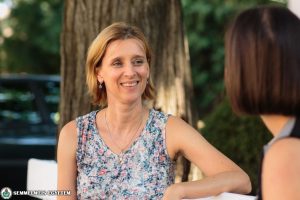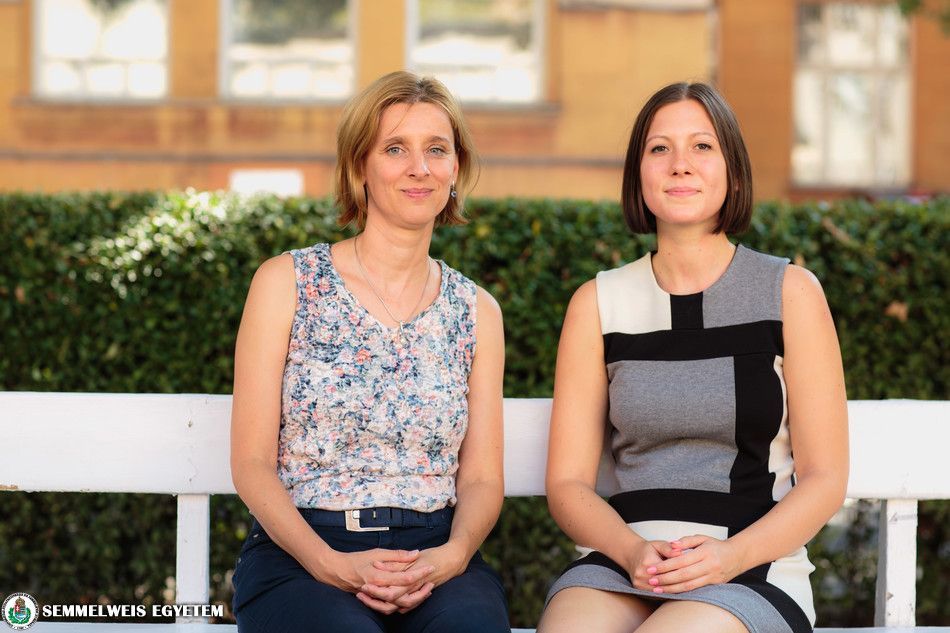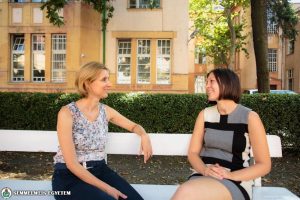 “When Vivien joined the Kerpel program, at first I only used to be her mentor, but she was very easy to motivate and soon she started to be interested in my area of medicine. Since then she has also joined my research group as well. The Kerpel program is indeed a program of excellence: those who are members can no doubt be proud of it. I have many fantastic students, but I think that the younger someone is at the time of joining the program, the more fruitful and colourful the mentor-student relationship will be.”, emphasized Dr. Veronika Müller.
“When Vivien joined the Kerpel program, at first I only used to be her mentor, but she was very easy to motivate and soon she started to be interested in my area of medicine. Since then she has also joined my research group as well. The Kerpel program is indeed a program of excellence: those who are members can no doubt be proud of it. I have many fantastic students, but I think that the younger someone is at the time of joining the program, the more fruitful and colourful the mentor-student relationship will be.”, emphasized Dr. Veronika Müller.
According to Dr. Müller, Vivien is a great student and it was easy to follow how well her knowledge was deepening and how fast she became open to the world. As Dr. Müller highlighted, this is the ideal case, because this way the relationship between the mentor and the student can be deeper as opposed to when a student joins the program at the fifth or sixth year during their studies. She also pointed out that this is how the relationship can become more personal.
“I was thrilled when I was able to join the Kerpel program, since I think having a personal mentor is a rare privilege, which includes a personal relationship and guidance. My mentor has had provided me with a lot of support so far and every milestone that I achieved or happened to me at the university is connected to her. I feel that I am very lucky.”, said Vivien Somogyi, who first read about the Kerpel program on the webpage of the university and she saw a great opportunity in it.
 According to Vivien, the students who are members of the Kerpel program in general would like to gain more than the average. As she recalled, when she applied to the program, she was first of all tested how motivated and dedicated she was. Obviously she did not yet have results at that time, being a first year student then. Vivien recommends to other students to join the talent support program as soon as they have an opportunity to do so, because it has many advantages. She personally made advantage of several scholarship opportunities, she started to do her TDK work with the help of her mentor and she could also join her mentor’s research group. As regards the research, she had an impact factor article published and she participates in conferences, she even won several awards.
According to Vivien, the students who are members of the Kerpel program in general would like to gain more than the average. As she recalled, when she applied to the program, she was first of all tested how motivated and dedicated she was. Obviously she did not yet have results at that time, being a first year student then. Vivien recommends to other students to join the talent support program as soon as they have an opportunity to do so, because it has many advantages. She personally made advantage of several scholarship opportunities, she started to do her TDK work with the help of her mentor and she could also join her mentor’s research group. As regards the research, she had an impact factor article published and she participates in conferences, she even won several awards.
Vivien does her research work in her free time, every once a week she spends 1 or 1.5 days at the Department of Pulmonology. As she expressed, in the framework of the research, they mostly examine patients with COPD (Chronic Obstructive Pulmonary Disease), asthma as well as patients with asthma-COPD syndrome. They do biomarker research and their aim is to characterize the forecast of diseases with such a parameter, which is not yet present in clinical practice.
With regards to this, Dr. Veronika Müller highlighted that in general there are fewer words about obstructive pulmonary diseases and respiratory problems as opposed to for example cardio-vascular diseases, however the air is very polluted in Hungary and this can cause serious problems. According to her, 700.000-800.000 people are suffering from any of these respiratory diseases mentioned above.
 Dr. Müller is very proud of her student. As she said, Vivien can cooperate very well with the other team members of the research group and she does a lot in order to become successful. Her mentor helps her, wherever she can. Dr. Müller also said that young people these days can work in a very subtle, thorough and precise way.
Dr. Müller is very proud of her student. As she said, Vivien can cooperate very well with the other team members of the research group and she does a lot in order to become successful. Her mentor helps her, wherever she can. Dr. Müller also said that young people these days can work in a very subtle, thorough and precise way.
Dr. Müller considers it as one of the advantages of the Kerpel program that the giant distance between the medical student and the clinical practice can be easily overcome via mentoring. This way the student can meet physicians, patients and clinical problems a lot earlier than compared to the general rhythm of education. This can provide students with fantastic ideas in studying as well. Dr. Müller emphasizes that what the student sees here, that will be an integral part of his/her studying and knowledge.
Vivien definitely reinforces this comment, who thinks that as a pulmonologist she will make use of the lot of practice she had already acquired at the clinic. Applying for PhD studies is also among her plans, also she would like to gain more international research experience, but she is also interested in resident training.
Her mentor supports her in going abroad and gaining professional experience there. Dr. Müller thinks that this is very important in the case of every young program member, since they bring back good practice that should be then observed carefully and taken into consideration by the current professionals of the field.
Szilvia Tóth-Szabó
Photo: Kovács Attila, Semmelweis University
Translation: Katalin Illés-Romhányi